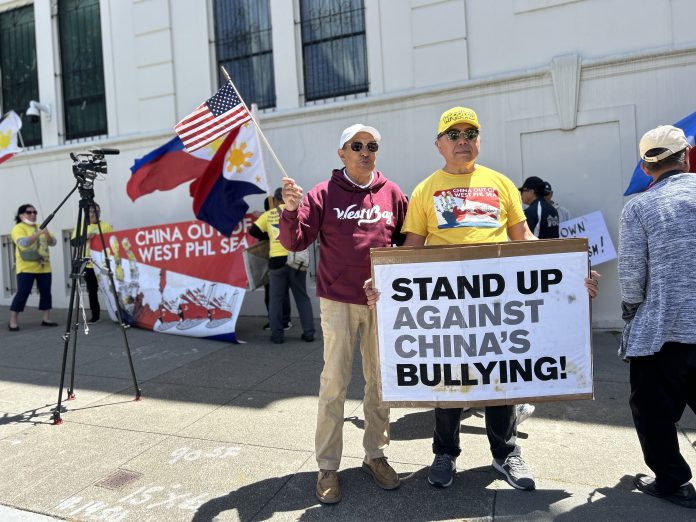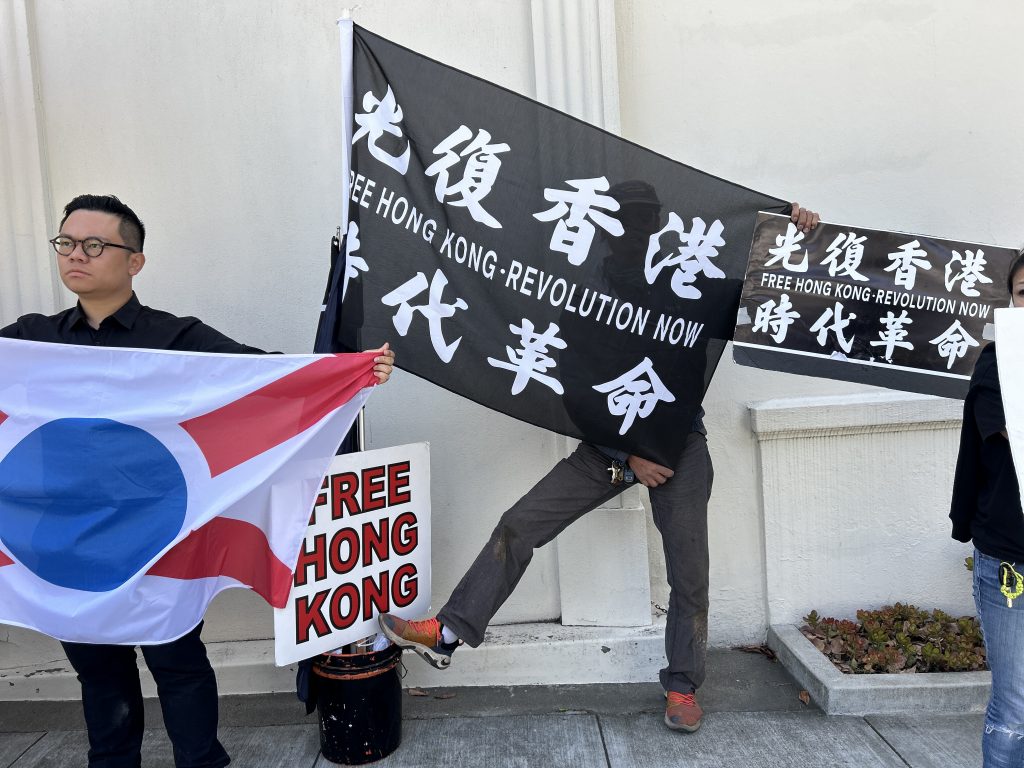By Jia H. Jung, California Local News Fellow
On June 17th, the Chinese coast guard rammed at high speed into Philippine navy boats at the Second Thomas Shoal of the Spratly Islands, or Ayungin, a maritime territory claimed by multiple nations. The Chinese military then boarded the crafts, brandishing long knives and machetes.
The Philippine navy had been resupplying and rotating personnel aboard the BRP Sierra Madre, an active duty ship deliberately marooned in 1999 to guard Philippine waters.
The clash, which resulted in the loss of a Philippine sailor’s thumb, was one of the most alarming in a saga of disputes in the West Philippine Sea, a portion of the South China Sea upheld by Philippine and international law as part of the Exclusive Economic Zone (EEZ) of the Philippines.
The involvement of both countries’ militaries sparked worries about whether the Philippines will invoke its mutual defense treaty with the U.S. – both countries have publicly confirmed that this course of action is not on the table.
Just a week before the skirmish, on the 126th anniversary of Philippine independence from Spain, the Filipino American Human Rights Alliance (FAHRA) and diverse Asian community groups rallied outside the Chinese consulate in San Francisco. They decried illegal Chinese aggression in numerous resource-rich disputed maritime territories in the South China Sea.
These aggressions include and are not limited to the extension of disputed claims in Taiwanese waterways, the construction of military installations in the Paracel and Spratly Islands, deployment of the Chinese Coast Guard into Vietnamese Waters, and harassment of village fishermen in the West Philippine Sea.
(A fuller description of these conflicts is included at the end of this article.)
The midday demonstration seemed small compared to the unrest in Manila on June 15 – but signaled how strongly Asian communities in the U.S. can feel about events half a world away.
Furthering the sense of urgency among participants was the fact that, on that same day, the Chinese government unilaterally put into effect a policy to be able to detain foreigners found in so-called Chinese waters for up to 60 days without trial.
The communities that have been following news about the South China Sea want Americans to know and care about what is going on even without escalation that would pull the U.S. military further into the region.
A wish for diplomacy, not U.S. military intervention
Concerns about Chinese expansion has led to the creeping return of U.S. military presence in the Philippines.
Some months after the eruption of Mount Pinatubo on June 15, 1991, the U.S. formally turned over the site of the Clark Military Air Base on Luzon island back to the Philippine government after controlling the land for 88 years.
A year later, the U.S. also deactivated the Subic Bay Naval base it had established in 1885. This was the last of the U.S. military bases in the country to be removed after extended domestic protests for full Philippine sovereignty.

The Enhanced Defense Cooperation Agreement, or EDCA. first signed between the Obama and Aquino administrations in 2014, allowed existing Philippine bases to be developed and used by rotating U.S. armed forces.
Then, in 2022, Philippine president Ferdinand “Bongbong” Marcos Jr. expanded the agreement to apply to a total of nine military bases.
While feeling under-protected from Chinese “gray area” aggressions in the West Philippine Sea, Filipinos are among the most globally organized anti-militarization voices in the U.S. and abroad. The opposition to further military escalation was loud and clear at the Consulate rally.
Standing up against the Chinese government’s illegal actions, not villainizing Chinese people
The Vietnamese contingent arrived first, holding up bright yellow flags of the Flag of South Vietnam, bearing three horizontal red stripes that symbolize the shared blood in Northern, Central, and Southern Vietnam.
Jack Duong of the Vietnamese community’s Anti-China Expansion Movement and Phan Hà, a representative of the San Jose-based Vietnamese American community of Northern California organization, said that they were committed to however many events it would take to bring further attention to China’s violations.
Phan added that she worked to make sure parents educate their children about their origin countries’ histories.” If we do not tell our kids who were born here about their history, they will have no idea why we came here,” she said. According to Phan, many Vietnamese people who fled to the U.S. as refugees of Communism dream of returning to the homeland, under the condition of freedom.
Ago Pedalizo, co-founder of FAHRA, soon joined the Vietnamese crew with fellow activists.
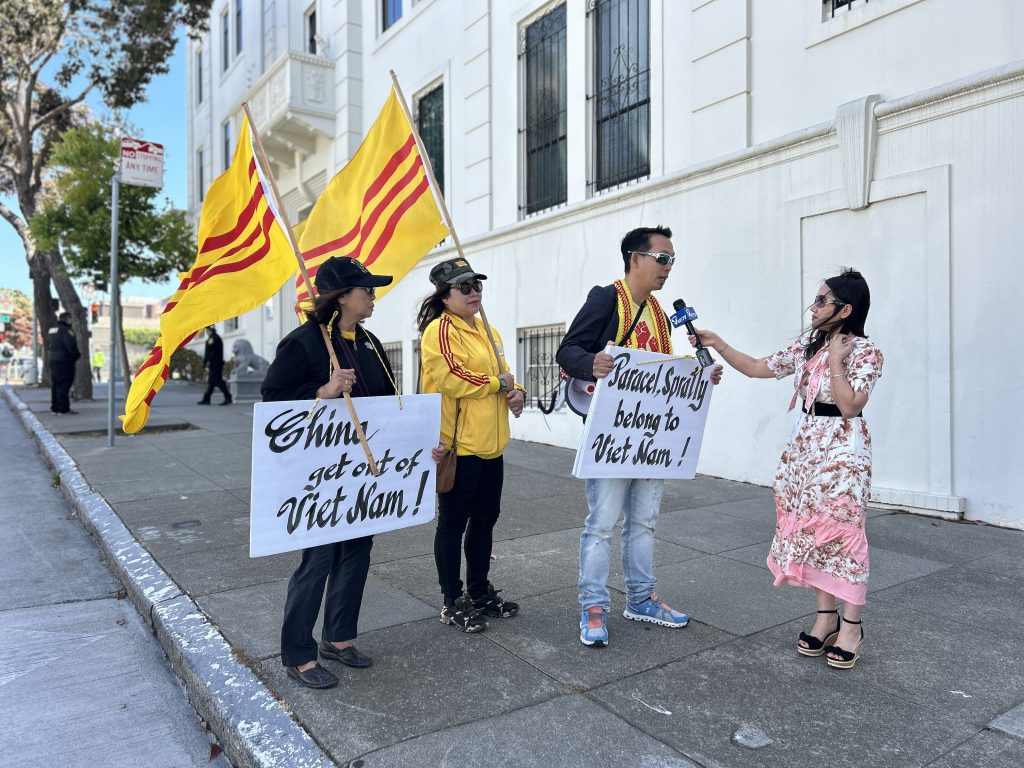
The alliance coalesced in 2016 against extrajudicial killings, political persecution, and corruption during the administration of former Philippine president Rodrigo Duterte. Pedalizo said that China’s illicit expansionism in a maritime area where 21% of global trade occurs is only strengthening the opposition to China within the countries in the affected region as well as within their corresponding diasporas worldwide.
Just the night before, Pedalizo had spoken at an appearance of twice-elected Philippine Senator Risa Hontiveros, deputy minority leader of the democratic, socialist Akbayan Party and the Senate Committee on Women, Children, Family Relations and Gender Equality.
The event was hosted at the main San Francisco Public Library and funded by FAHRA, Akbayan North America, and the What Can We Do Group formed in 2022 after the election of Ferdinand “Bongbong” Marcos Jr. to analyze the social impacts of disinformation and historical revisionism.
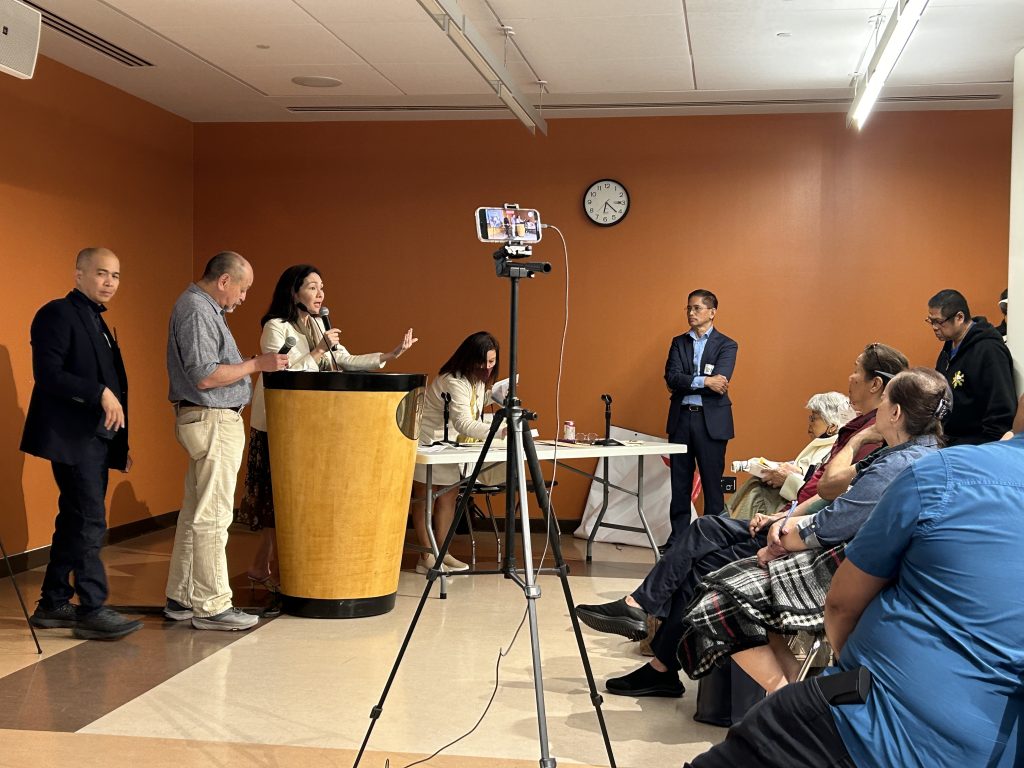
Over 100 people gathered to see the senator, highly respected for her advocacy for marginalized people and dogged investigations into governmental corruption.
In response to the audience’s questions about how to balance China’s power in the West Philippine Sea, the senator said, “No bully will respect you if you don’t stand up, not even in a playground, let alone an ocean or a world.”
She emphasized that strong alliances were critical and that the strengthening of ties with the U.S. must be “a renewal of an alliance but on the basis of equals – no more little brown brother of the past.”
Outside the Chinese consulate, AsAmNews asked Pedalizo how to call out China’s illegal actions in U.S. dialogue without encouraging the xenophobic sentiments that underlie exclusionary policies like alien land laws that hurt all Asians in America.

He responded that progressive organizations are never against people, but against governments and systems that hurt those people.
As a dual citizen, his opinions have double power. He can vote in the 2024 U.S. presidential and general elections, 2025 Philippine presidential and general elections, 2026 U.S. Senate elections, and 2028 Philippine Senate elections. Many others in the Fil-Am community share this status and ability, but numbers are hard to document.
Pedalizo prepared everyone at the rally to start marching promptly at noon. He told those with speeches to speak distinctly because 30,000 YouTube viewers and 50,000 Facebook viewers were tuning into the live streamed event. VIETV Network, based in Houston, TX, was broadcasting onsite, as were several other news outlets.

Rommel Conclara, born and raised in Daly City, gathered video footage for TFC News, a global-facing program of ABS-CBN, the largest media network of the Philippines.
The special perspectives of Chinese-speaking communities in the U.S.
One of Conclara’s interviewees was Jen Wong of the U.S. Hongkongers Club, who in her speech reminded everyone that Philippine Independence Day coincided with the beginning of the Anti-Extradition Revolution In Hong Kong in 2019.
In the largest series of demonstration in the peninsula’s history, 2 million of the 7 million people living in Hong Kong protested a bill amendment to force the return of fugitives to mainland China. The Chinese Communist Party (CCP) cracked down on pro-democratic Hong Kongers, taking prisoners, shutting down newspapers, and creating political refugees.
In a follow-up text to AsAmNews, she said that the CCP had undercover police all over the U.S. and that some had followed her around and questioned her newly met friends.
She said that the members of her club, founded in 2020, were regular people who wanted to raise awareness in the general American public about China’s worldwide manipulations. She said that China amended its Counter-Espionage Law last year, technically requiring Chinese passport holders to report activities against CCP China anywhere in the world.
“Hopefully we can join together because one ethnic group is not enough,” she shouted, at the rally.
Loio Zheng, Shepherd, and Kevin Xu were a trio of Chinese-speaking American residents representing mainland Chinese grievances against the CCP. The three men had known each other back in China; Zheng and Shepherd, who now reside in the Bay Area, informed Xu about the rally.

Xu, a member of the Far East Freedom Youth League who just finished his sophomore year at college in Minnesota, drove alone for seven days out to the West Coast to attend.
He told AsAmNews in follow-up text exchanges that he came to the U.S. on a student visa in 2022 and applied for political asylum after the CCP police interrogated his parents in Shanghai. This happened after he was already in the U.S. and made X posts under a pseudonym, criticizing the pandemic lockdown of Shanghai and mandatory Chinese vaccines.
The police intrusion upon Xu’s family only emboldened him. He told AsAmNews that he wrote a report at the invitation of the FBI. He also created an X account as his true self and used his real Mandarin name when speaking with Radio Free Asia after his rally speech.
“Of course I’m afraid for my parents’ safety. But, I have no choice. I have to be outspoken since that’s my freedom, freedom without fear. There shouldn’t be any fear for me in the land of freedom,” Xu said to AsAmNews.
Shepherd is a member of the Yunnan Independence Movement by association with his wife, who is from the southwestern province of China. He hails from Shanxi in Jinland, an area in northern China that includes the Shaanxi province and parts of Inner Mongolia. In his speech, he called Yunnan the “earliest and most suffering victim of China’s expansion” because of coerced development that has resulted in pollution and human rights violations.
He said that, though Yunnan had no maritime claims, its people were living with the terrestrial version of the terror others faced at sea.
“What we once suffered might happen to you and your descendants,” he warned, before passing the microphone.

Zheng, representing the Cantonia Independence Party, spoke in Chinese with Shepherd as his interpreter and led the crowd in a chant first in Chinese and then in English for China to exit the Philippines, Vietnam, Taiwan, Hong Kong, Shanghai, Cantonia, Yunnan, the Paracels, the Spratly Islands, Tibet, Bhutan, East Turkestan (or Uyghuristan), Mongolia, and the West Philippine Sea.
Growing maritime woes of ‘Indo-Pacific’ are still not a top priority for U.S. foreign policy
A Taiwanese contingent was noticeably absent from the rally at a time when China has demonstrated what U.S. and regional defense officials and global think tanks interpret as rehearsal for likely invasion of the island at any moment.
The U.S. still owes $19 billion in U.S. military aid commitments to Taiwan to shore up its defenses – for perspective, Taiwan’s entire defense budget is $20 billion.
In a recent email statement to The Epoch Times, Capt. Matthew Comer of the U.S. Indo-Pacific Command in charge of Army, Navy, Air Force and Marine Corps operated in the vast region, stated that the maritime disputes had not become enough of a priority to divert resources there yet.
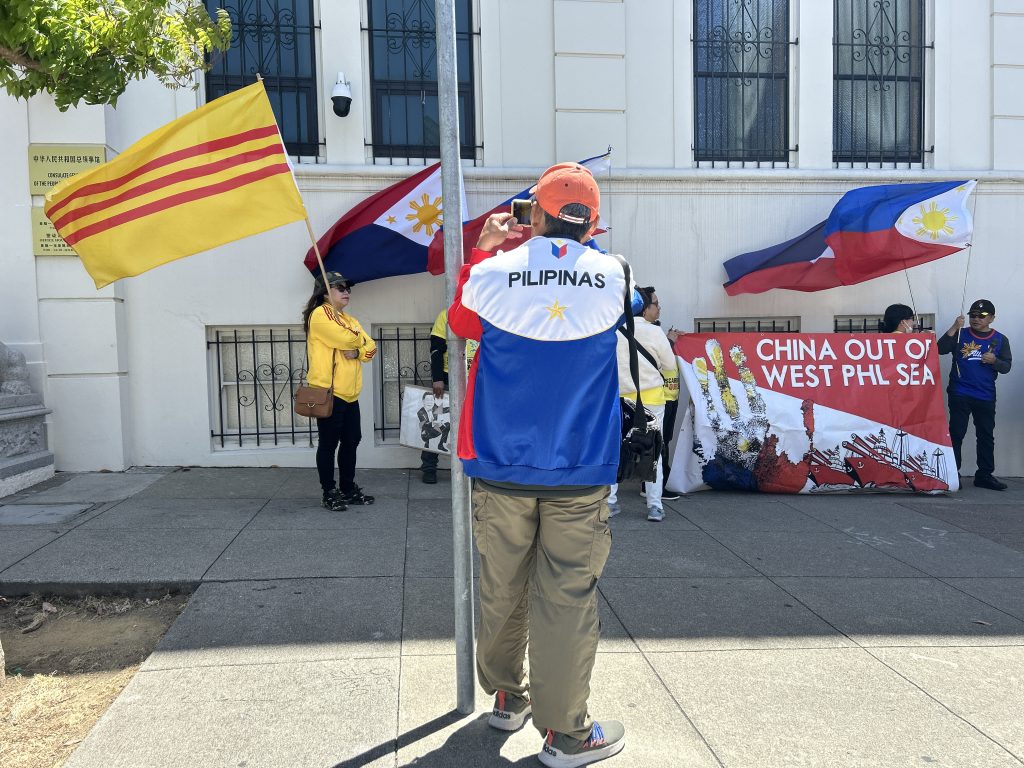
Over lunch with Filipino American community leaders after the rally, Rad Abarrientos, an officer of the National Youth Movement for the West Philippine Sea founded and chaired by Guam-based Dr. Celia Lamkin, wondered why the U.S. has done so little for the Philippines, either.
But the wish among Filipino Americans for better support from the U.S. is not a call for the American military to intervene.
At her talk, Sen. Hontiveros had addressed the twin problems of Chinese aggression and U.S. militarization. She said that, as “a young working person” in 1992, she protested in the rain against a proposed Treaty of Friendship, Cooperation and Peace between the Philippines and the U.S. that would have given 10 more years to the Subic Naval Base. She said she cried with the joyful masses when the 12 Philippine senators rejected the treaty, finalizing the closure of the base.
These days, she said that the nation’s diplomatic discussions need to stop worrying about what is anti-China or pro-U.S. and start focusing on what it is to be pro-Philippines.
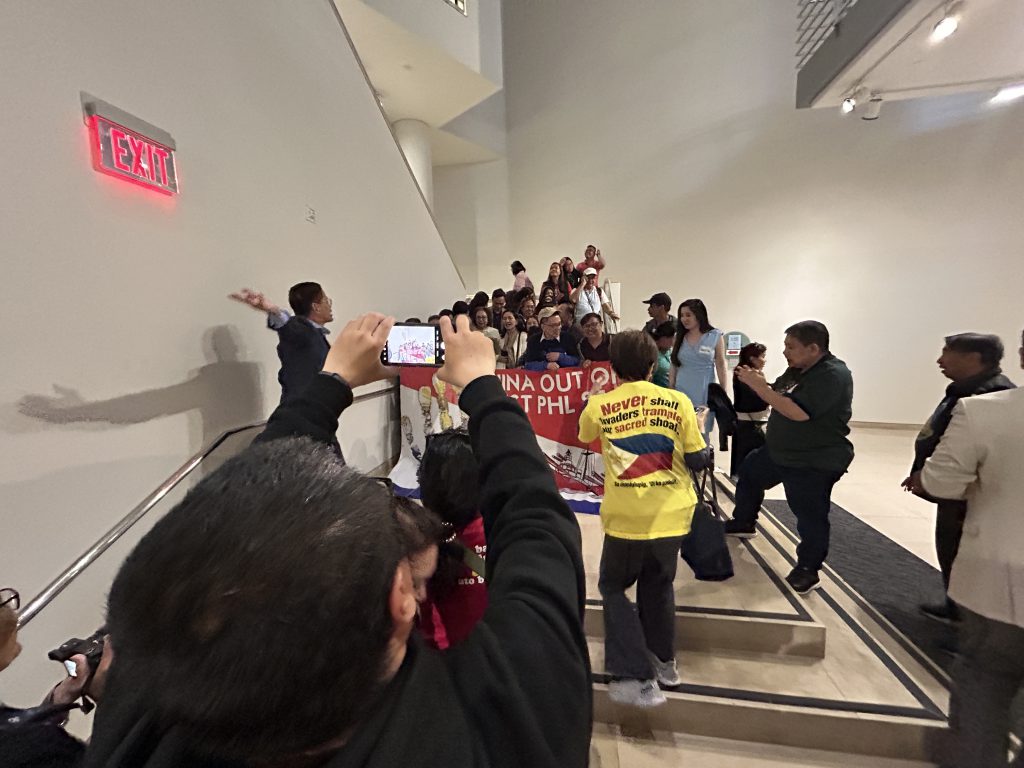
She also advised Filipinos to make conceptual space for partnership with old allies, new allies, and even former enemies from World War II like Japan, whose interests now coincide with the priority of respecting and protecting maritime territories in the South China Sea.
The outlook of a Gen Z commissioner of Daly City, Calif., the largest Filipino enclave in America
The bulk of the crowd at the senator’s talk was older generation Filipino immigrants, dual citizens, and overseas Filipino workers of the Philippines. One of the people who got a snapshot alone with the senator was Filipino American Fernando Montanes, 23, sworn in in March as the youngest and first ever Gen Z Daly City recreational commissioner appointed by City Council.
Daly City, with 34,000 residents of Filipino heritage, is the largest and most concentrated community of Filipinos in the country. The city’s mayor, Juslyn Manalo, and vice mayor, Rod Daus-Magbual, are also Filipino.
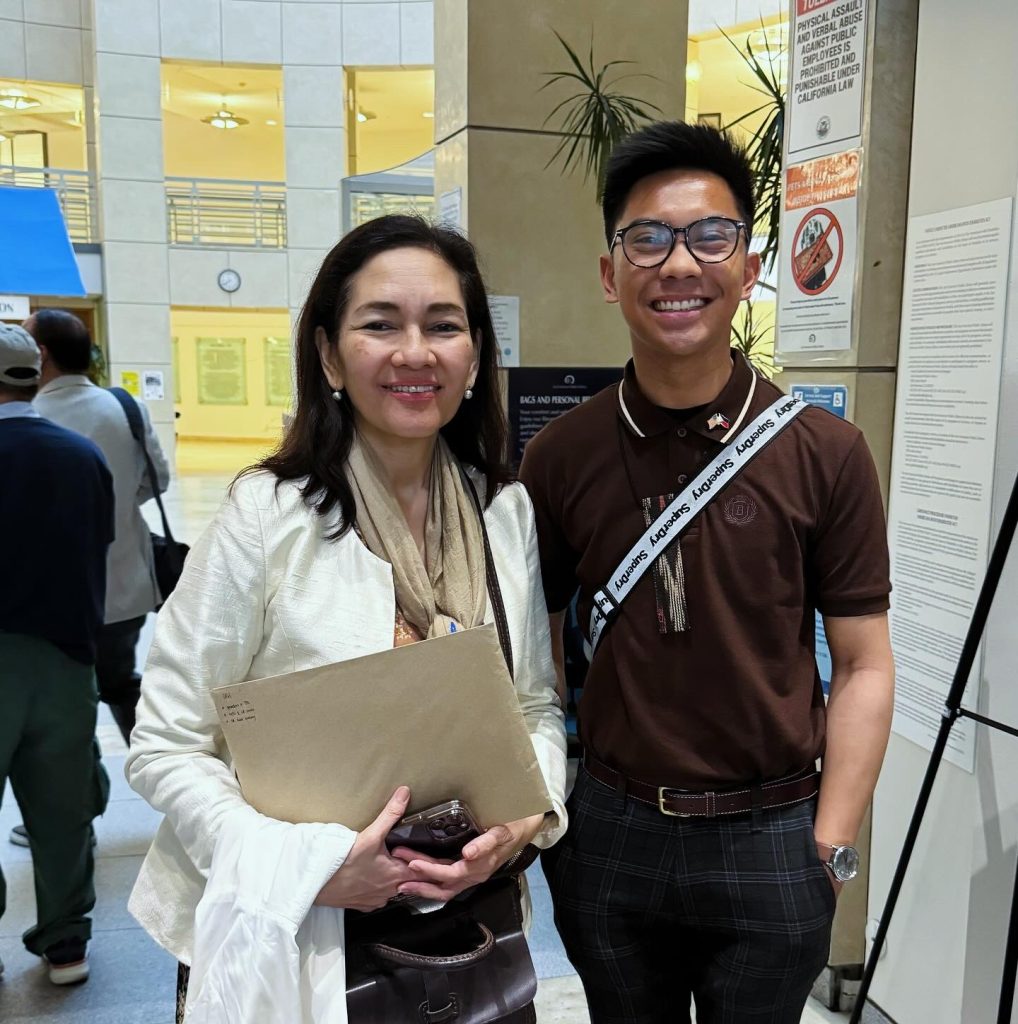
Photo courtesy of Fernando Montanes
In text exchanges with AsAmNews in the days following the senator’s visit, Montanes said that his views as a Filipino American had also been formed by the community’s outrage over Duterte’s atrocities and the restoration of the Marcos dynasty immediately thereafter.
“Learning about Filipino history has politicized the community and brought upon agitation to organize in solidarity with our kababayans (fellow Filipinos), back home,” Montanes reflected.
On June 14, Montanes attended the tenth consecutive raising of the Philippine flag, days after his kababayans rallied at the senator’s visit and outside the Chinese Consulate.

The saga continues with a rapt global audience
Less than two weeks later in Manila, prominent members of the Philippine press and government appeared in a panel at the East-West Center’s International Media Conference on June 26th to discuss the June 17 attacks by China. The experts confirmed yet again that the Philippines did not wish to seek military escalation or stoke Sinophobia in Philippine society.
At the same time, amid China’s claims that the military and media of the Philippines manipulated video footage of the tussle at Second Thomas Shoal, the members of the panel urged the international media to make people aware of the gravity of China’s violent and illegal acts instead of couching them in neutral language out of fear of rocking the boat.
Jonathan Malaya, the Philippine National Security Council’s assistant director general, said, “Since media is already there and actually sees what is happening, it would be best as a partner in spreading information – the truth – to call it for what it is. Because international law favors the Philippines.”
China has since deployed an aircraft carrier to the West Philippine Sea while the Philippines continues seeking direct negotiations with Beijing.
A key to disputed maritime territories in the South China Sea
The West Philippine Sea: The WPS is a part of the South China Sea legally affirmed by both Philippine and international law as sovereign to the Philippines. Just days ago, China unilaterally instituted a policy to detain foreigners deemed to be trespassing in the South China Sea, flouting the South China Sea Arbitration ruling made on July 12, 2016 by a U.N.-affiliated court in adherence to the U.N. Convention on the Law of the Sea to which China is a signatory. The G7 nations, Canada, France, Germany, Italy, Japan, U.K., and the U.S., have already condemned this as part of global alarm over China’s obstructions of other nation’s movement on the high seas, and its encroachments upon foreign EEZs, or exclusive economic zones.
Vietnam’s EEZ: Vietnam has frequently spotted the Chinese Coast Guard in Vietnamese waters, especially where Russian companies have been drilling into gas fields. These spats add to worldwide concerns over increasing Chinese-Russian cooperation in the Indo-Pacific and Chinese-Russian-Iranian cooperation in the Arabian Sea.
Taiwan Strait: This 110-mile wide waterway separating the island from continental Asia is illegally and almost wholly claimed by China and enforced by “gray zone” tactics – coercive actions that still can’t be classified as war. One of the greatest examples of this is a network of artificial islands built to hold military installations. Last year, the annually published Chinese national map expanded the already controversial “nine-dash line” encircling most of the disputed South China Sea with a 10th dash bringing all of Taiwan and the waters to the East of the island into the collection of China’s disputed maritime claims.
Paracel Islands: Paracel, the Portuguese word “placing,” refers to what Vietnam calls the Hoàng Sa Archipelago. The site possesses fertile fishing grounds and possible oil and gas deposits. Vietnam and Taiwan claim the islands, but China has occupied all of them since 1974, building a military installation and artificial harbor on one of the islands, and garrisons on the others.
Spratly Islands: These 100 islets and reefs also boast rich fishing grounds and potential oil and gas reserves. Vietnam, Taiwan, and China wholly claim them, while the Philippines and Malaysia have partial claims. All five countries have military bases scattered across 45 of the Spratlys, which are adjacent to a continental shelf within Brunei’s jurisdiction. China has built an artificial island there, too, to hold its military activities and equipment.

AsAmNews is published by the non-profit, Asian American Media Inc.
We’re now on BlueSky. You can now keep up with the latest AAPI news there and on Instagram, TikTok, Facebook, YouTube and X.
We are supported by generous donations from our readers and by such charitable foundations as the Robert Wood Johnson Foundation.
You can make your tax-deductible donations here via credit card, debit card, Apple Pay, Google Pay, PayPal and Venmo. Stock donations and donations via DAFs are also welcomed.

